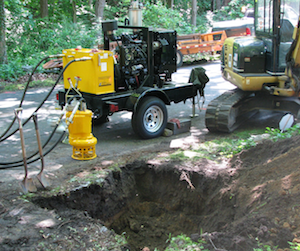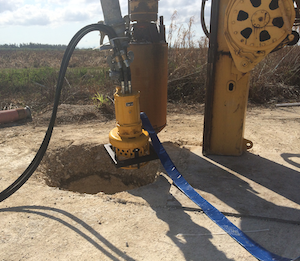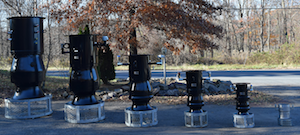Rental Solutions: Pump alternatives
Are hydraulically driven submersible pumps a part of your pump fleet offerings?
By Jeff Whittaker
When it comes to rental companies, there is great disparity between them with respect to their submersible pump offerings. Some rental companies don’t offer any pumps; a small selection of 2-, 3- and 4-inch electric dewatering pumps and a similarly sized variety of
 |
| Hydraulic pumps can be used at depths greater than 30 feet where other pumps don’t have enough head pressure to reach those heights/depths. |
 |
| Hydra-Tech pumps often offer a fuel-saving alternative to engine- or electric-driven pumps because they can run at variable rates, based on demand. |
 |
| Hydra-Tech hydraulic pumps come in a variety of sizes that can be matched to the job for fuel-efficient and reliable pumping. |
gas-powered trash pumps. Then there are rental companies, including some of the largest that have entire divisions dedicated to dewatering and have a wide variety of pumps available to handle almost any job. These dedicated pump rental locations offer larger electric submersibles, engine-coupled centrifugal, diaphragm and double-diaphragm pumps, well point pumps, plus the usual small electric and trash pumps and all of the accessories.
For those rental houses that offer electric and gas pumps but have had no experience with hydraulically driven pumps – why should you consider hydraulically driven?
Greater flexibility
Hydraulically driven dewatering pumps and the hydraulically powered units that make them work provide greater flexibility and safety than an electric submersible pump, as well as greater head capability than gas-powered trash pumps. They do not expose operators to the potential risk of electric shock and do not require an electrician for set up that is needed with bigger electric submersibles. Hydraulically driven submersibles can be used in hazardous environments. Setting up a hydraulic pump requires only normal hand tools to connect the hydraulic hoses and discharge hose.
When compared with engine-driven centrifugal pumps, the biggest advantage that hydraulics hold is related to head, or the depth the from which the pumps can pump. Most self-priming centrifugal pumps have a suction lift limitation of 25 feet. If the water you are pumping is deeper than that, engine-coupled centrifugal pumps are not an option.
Greater head pressures
Hydraulic submersibles “push” the water and as a result, are not affected by suction lift limitations. Like any pump, they have a height or total dynamic head at which they will no longer deliver water, but it is significantly greater than the 25- to 30-foot limitation of centrifugal pumps.
The other advantage to submersible hydraulic pumps when compared with engine-driven centrifugal pumps is there is no need for priming. Once you activate the hydraulic oil flow to the pump, it will pump as long as it is fully submerged.
Compared with electric and centrifugal pumps, hydraulically driven pumps tend to have a lower cost of ownership and operation.
Operation
Any hydraulically driven submersible pump needs a hydraulic power unit (HPU) to supply the hydraulic flow and pressure needed to operate the pump. There are gas- and diesel-powered HPUs powered by engines as small as five horsepower and as large as 400 horsepower and greater.
The size of the power unit is determined by the pump you will be using – specifically the flow and pressure required to obtain maximum performance from the pump, or at least to get to the curve with the duty point you want to hit.
There are electrically powered HPUs, but they are rarely used for the portable applications targeted by rental houses. The nice thing about hydraulic power units is that it’s possible to run more than one pump with similar hydraulic requirements with the same HPU.
The HPU is basically a skid or towable trailer-mounted engine that drives a hydraulic pump fed by a hydraulic oil reservoir. It provides an open-center hydraulic circuit – hydraulic hoses are connected to the quick-disconnect fittings on the back of the hydraulic oil reservoir and provide a pressure and return line to the pump.
Hydraulic-powered submersible pumps offer the benefit of variable speed to suit the job conditions. Unlike an electric motor that is either on or off, the engine throttle on an HPU can be adjusted to suit the job conditions and save fuel and energy.
Think about it this way – if you are doing a sewage bypass job with varying flows, the engine on a hydraulic power unit can be throttled up or down to suit the inrush flows at different times of the day, saving fuel, where a generator typically runs at a fixed speed regardless of the demand on the pump in the hole. This difference can result in considerable fuel savings over the course of weeks or months on the job.
Applications
So what are some of the applications where hydraulic submersibles are typically deployed? In municipal applications, they can be used for sewage bypass jobs, water treatment, manhole dewatering and flood control. In the construction world, general dewatering is an obvious application, but they can also be used for cofferdam work, lake drainage and river/stream bypass work. In mining and quarry applications, hydraulically driven pumps are great for blast hole dewatering, general quarry dewatering, dredging and moving sand at a sand plant.
Well-drilling companies and directional drillers like hydraulically driven pumps because their rigs typically have a hydraulic circuit that can also power the pumps. They are also used in a wide variety of applications in the oil and gas industry.
For rental houses along either coast or the Great Lakes, there are plenty of opportunities with marine service and salvage companies including diver-controlled vacuuming/dredging, salvage operations pumping, cargo off-loading, ballast pumping, oil skimming and recovery.
Hydraulically driven pumps can be powered with environmentally friendly biodegradable vegetable oil, rapeseed oil, zinc-free oil or other fuels.
Jeff Whittaker is vice president, sales, marketing and product development at Hydra-Tech Pumps.
This story was originally published in the March-April 2019 issue of Pro Contractor Rentals magazine. © Urbain Communications LLC. All rights reserved.








